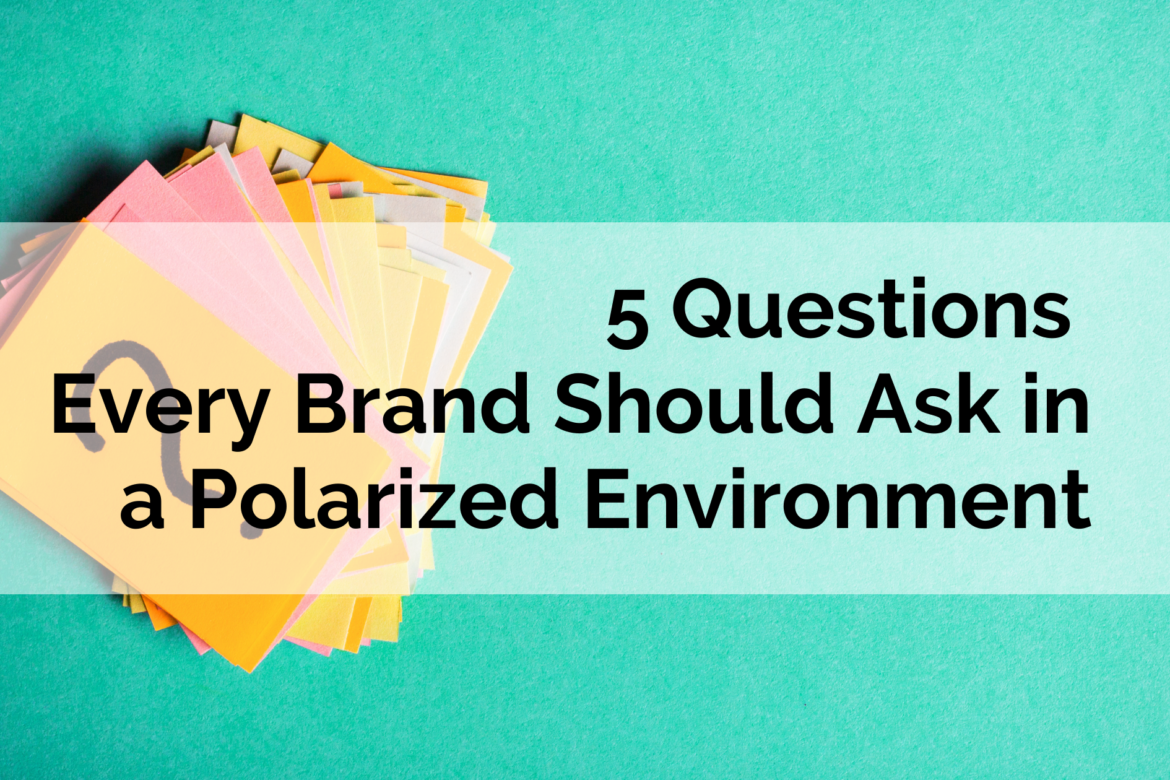In the past few months, it has felt like a tsunami of developments in significant current events. With an increasingly polarized country, these changes have been subject to radically different interpretations and perspectives. One consistent conversation has been around how citizens may have an expectation that businesses and business leaders should exercise their voice to weigh in on issues through company branding. Before subjecting your brand reputation to the risks of public and political engagement, you should ask yourself some important questions.
What context and story matter in this narrative?
When a current event causes widespread controversy, there will be many ways to approach it. Individual, societal, political, and financial considerations likely apply, so it is important for a brand to decide how and why it wants to insert itself into the conversation. For example, Nike’s support of Colin Kaepernick focused on free speech and the right of an individual to stick to their convictions in the face of adversity – messaging that resonated with the Nike brand focus on the sacrifices and motivations of individual athletes. In doing this, Nike sidestepped issues of race, the military, and patriotism, all of which were elements of the controversy.
Is this move continuing the conversation or ending it?
Statements can be made in many forms – of a page-long position statement, a retweet, an investment (or divestment) decision, or even silence. Under pressure from other influential voices, even staying on the sidelines is considered a “position” subject to response, be it praise or critique. Knowing that an issue is unlikely to simply disappear, brands should consider what role they want to play in the controversy.
Recently, a number of entities, like the MLB, waited until after the Georgia legislature had voted to change certain election laws to announce “consequences.” The MLB withdrew the All-Star Game from the state, claiming that it did not want to use the Atlanta venue because the new laws were discriminatory and undemocratic. The MLB move was criticized on all sides for multiple reasons, but, importantly, the act was timed after the law was passed, so it didn’t invite a productive response from Georgia so the decision became the issue rather than furthering the conversation about voting rights and election fraud.
Is this a single action or does it create momentum?
It may be tempting to try for a “one and done” approach that begins and ends the brand’s involvement. But in reality, the public discourse will continue, and brands should try to be a part of the conversation by engaging in a dialogue rather than a monologue, inviting participation, feedback, and continued engagement. Well-crafted hashtag campaigns are one way to encourage followers to join in and for brands to keep their fingers on the pulse of the conversation. To draw awareness to sexual assault and rape, the #MeToo movement deployed an incredibly successful hashtag that invited others to join. In another example, Long associated with its first major partner – MTV – the organization Rock The Vote has spent decades raising awareness and encouraging free speech and political engagement of young people. MTV promoted the organization, affiliating itself with a movement that is still active to this day.
What will be the impact on my stakeholders?
When an issue of the day calls for brand engagement, the level, perspective, and consequences will be felt by the constellation of stakeholders. A brand needs to consider who will be impacted and how. The MLB is answerable to the owners, the players, and all the peripheral businesses that exist solely to support it. How were each of these stakeholders impacted? In Georgia, millions of dollars will be lost by the move of the All-Star Game, and the MLB’s decision to move the game to another state with similar voting laws did little to signal consequences to other states considering similar legislation. People on both sides of the political spectrum make up their stakeholders. So, the statement pleased no one in the end, which resulted in a reputational blow to the MLB brand. On the other hand, brands are having to negotiate the increased call for boycotts when they don’t take the “right” action on an issue. Did the MLB prevent a bigger loss to its reputation and possible financial losses from a boycott by acting as it did? Any brand considering engagement with a timely issue should consider the impact.
Does this move align with the brand’s mission?
A brand can get into trouble when it dives into an issue that does not relate to its underlying mission. As with most organizations and businesses, the MLB has an explicit mission related to diversity and inclusion, believing that “The power of our collective creates meaningful impact for our people, our fans, and our communities. In that sense, the decision to enter into the fray of the Georgia voter’s rights controversy aligned with its stated purpose. In his press release, the commissioner explicitly referenced the MLB’s commitment to community and pledged to continue with its plan to make local investments in Atlanta notwithstanding the move of the All-Star Game to another city.
In today’s ultra-connected world, consumers look to brands for their position on the day’s events and issues. Staying out of the fray simply isn’t possible, but every brand should make a point to be thoughtful and strategic in its engagement. Before jumping in with anything from a significant corporate policy change to a retweeted meme, brands need to proactively manage their stance by asking themselves how and why they want to manifest. Making these decisions with purpose and intent will help manage any reaction that ensues.
Jen Dalton is a personal brand specialist with entrepreneurship in her DNA. Her book, Listen: How To Embrace the Difficult Conversations Life Throws at You, is an insightful guide into navigating tough talks. She helps business owners and executives define how they show up as leaders, make the most of their strengths, and tend to their legacy, growth and visibility. The author of two books, frequent speaker, podcaster, and “Purpose Sherpa,” Jen is a critical resource for any person or company that wants to define their brand and differentiate themselves in authentic, credible, and relevant ways to the market.

